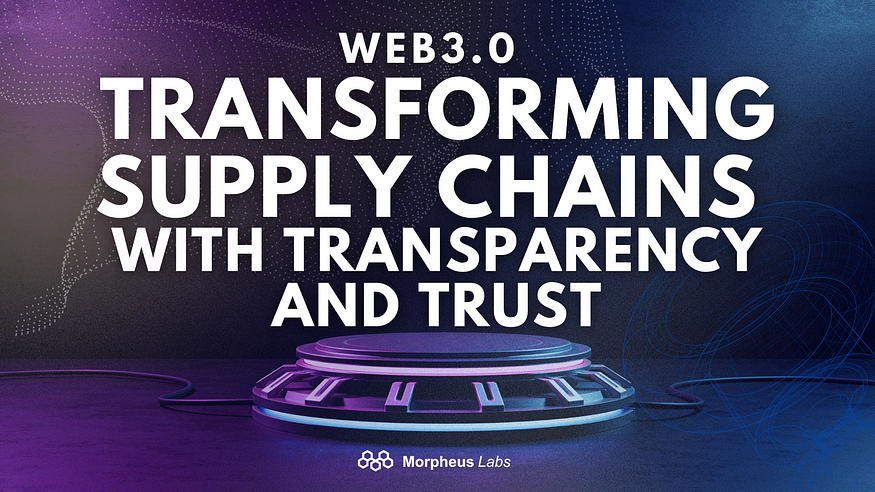News blog
labore et dolore magna eiusmod
consectetur adipiscing elit, sed do eiusmod tempor incididunt ut labore et dolore magna aliqua. Ut enim ad minim veniam, quis nostrud exercitation ullamco laboris nisi ut aliquip ex ea commodo consequat risus Ut mattis

Transforming Supply Chains with Transparency and Trust
The quest for supply chain transparency has never been more crucial. With consumers demanding more information about the products they buy and businesses striving for resilient and accountable supply networks, the rise of Web3 technology holds the promise of revolutionizing supply chain transparency.
Exploring the fundamentals of blockchain and its role in Web3.
Blockchain technology is a decentralized and distributed ledger that records transactions across multiple nodes or computers. It operates on a consensus mechanism, where participants agree on the validity of transactions through a consensus algorithm.
In Web 3.0, blockchain plays a pivotal role by providing a secure, transparent, and tamper-resistant infrastructure for decentralized applications, it ensures that data and transactions are verified and stored in a transparent manner, fostering trust among participants. Blockchain enables the creation of immutable records, smart contracts, and decentralized governance models, revolutionizing the way digital interactions occur in Web 3.0. [1]
The Imperative for Transparency
Supply chains, complex networks of manufacturers, suppliers, distributors, and retailers, are the lifeblood of our global economy. They deliver everything from food and clothing to electronics and healthcare supplies, yet they often operate behind a veil of opacity.
This lack of transparency has given rise to several pressing issues:
- Ethical Concerns
Consumers want to know if the products they buy are ethically sourced, produced, and distributed. For example, is the coffee they enjoy sustainably harvested, or does it involve exploitative labor practices?
For example, the average hourly wage in India is $1.26, according to Insightful, This hourly wage is far lower than the minimum wage in the U.S., which is $7.25 according to USA.gov. However, no law says overseas workers must be paid at the U.S. wage Scale. As a result, an organization must ensure that its partners are not engaging in exploitative labor practices and continue to uphold basic human rights. [2]
- Safety and Authenticity
It is vital to ensure workforce safety in the host nation. Some suppliers may need more quality control to maximize profits and save on production costs, leading to unsafe working conditions, unsafe working conditions, unreasonable working hours, and unsafe products.
Issues like food recalls counterfeit products, and subpar quality are common. Consumers are seeking assurance that the products they purchase are safe, genuine, and of high quality. [3]
- Environmental Impact
Environmental awareness is growing, and consumers are pushing companies to reduce their carbon footprint and minimize waste. This necessitates transparency in understanding a product’s environmental impact.
Furthermore, an organization needs to ensure that its supply chain is environmentally sustainable. As concerns about climate change and environmental degradation continue to grow, companies are increasingly expected to minimize their ecological footprint by:
- Sourcing raw materials in a sustainable manner
- Minimising waste
- Managing waste properly
- Prevention of deforestation, water depletion, and water pollution
- Reducing carbon emissions
- Encouraging business partners to follow environmentally responsible practices.[4]
Web3: A Paradigm Shift for Transparency
Many Companies struggle with a lack of end-to-end visibility and transparency in their supply chains. Despite the growing expectations of consumers and governments alike, many organizations are still unable to provide irrefutable information regarding provenance and chain of custody.
- Immutable Records
Blockchain allows for the creation of tamper-proof records. Each stage of a product’s journey can be documented on a blockchain, guaranteeing the integrity of the supply chain history.
Case study: De Beers, one of the largest diamond producers in the world, has implemented a blockchain-based tracking system called Tract. Tracr allows De Beers to track diamonds from the point where they are mined, through the cutting process, polishing process, and ultimately to the end consumer. This helps to combat the trade in conflict diamonds.[5]
- Smart Contracts
Smart contracts can serve various purposes in supply chain management and are maintained through a blockchain. For Instance, certifier and standardization bodies can verify the digital profiles of entities and products. The digital profiles can be modified by the actors; however, they require subsequent approval from the registrar and certifiers on the network. The rules of the smart contract cannot be modified by individual trading partners, and this would require consensus by the majority of the actors or certifiers.
- Building Consumer Trust
Web3 technologies provide transparency and accountability that foster trust with consumers. When they can easily verify product authenticity, sustainability, and ethical standards, they are more likely to support companies that embrace these technologies.
Case Study: Apart from Ethically sourced diamonds, lithium batteries due to their huge global demand are prone to counterfeiting. However, with the adoption of blockchain, manufacturers can counter that by assigning barcodes to products and generating unique tokens. Each token contains cryptographic seals that denote the certification, originator, registry, and other data that prove the authenticity of each battery.
Morpheus Labs involvement
For businesses looking to embark on the transformative journey of integrating Web3 technology into their supply chain management, Morpheus Labs offers a streamlined pathway. Our platform provides a suite of developer tools and services, simplifying the development process and reducing the complexities often associated with blockchain technology. Whether you are a seasoned developer or new to the world of Web3, Morpheus Labs ensures accessibility and efficiency throughout your project. We understand that navigating the complexities of blockchain, smart contracts, and supply chain management can be daunting. That’s why we are here to support you every step of the way, from ideation to implementation. Our mission is to empower businesses to harness the potential of Web3 for enhanced transparency, accountability, and efficiency in their supply chains. With Morpheus Labs, your supply chain transformation is not just an idea; it’s a tangible reality.
Challenges and Considerations
There are still substantial hurdles to be overcome. On a basic level, the adoption of blockchain technology is still hampered by a poor understanding of its applications outside of cryptocurrencies.
As blockchain transactions take place on a public, shared ledger, businesses need to be comfortable operating with a much greater degree of transparency than most private enterprises are used to.
In emerging markets, it is almost accepted that the size and complexity of modern supply chains alone enable unseen corruption. Any attempt to expose this fraud would be met with significant pushback.
Blockchain introduction across a supply chain would mean a complete redesign of current information-sharing protocols to enable every party to view and update data. The associated costs are not insignificant, and pilot projects need to identify major efficiencies early on in order to justify a wider rollout.
The Path Forward
The integration of Web3 technology into supply chains is inevitable. As consumers continue to demand greater transparency and accountability, businesses will find it increasingly necessary to embrace these innovative solutions.
Web3 has the potential to redefine how we view and manage global supply chains. It offers unprecedented transparency and accountability that satisfies consumer demands while enhancing the resilience and sustainability of supply chains.
As we move forward, the shift towards greater visibility and accountability will not only satisfy consumer demands but also enhance the resilience and sustainability of supply chains. By harnessing the potential of Web3, supply chains can evolve into systems that prioritize efficiency, profitability, ethics, safety, and environmental stewardship, benefiting businesses, consumers, and the planet alike.
In conclusion, Web3 technology provides a new opportunity to address the longstanding challenge of supply chain transparency. This shift toward greater visibility and accountability is set to usher in a new era of responsible commerce, redefining the way we view and manage global supply chains.
References
[1] https://turcomat.org/index.php/turkbilmat/article/view/13931
[3] https://hbr.org/2020/05/building-a-transparent-supply-chain



















